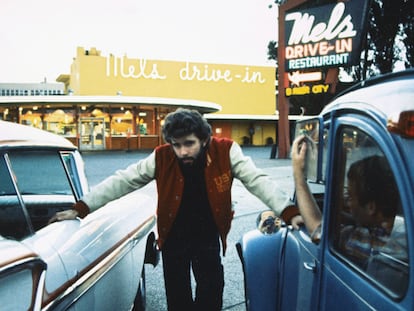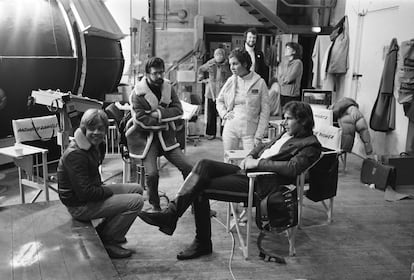It seems incredible that George Lucas turned 80 just ten days ago. Sitting this Friday before a group of journalists in Cannes, the Californian – the man who changed the history of cinema with Star Wars, the creation of the saga Indiana Jones and the founding of companies such as Lucasfilm, THX or Industrial Light & Magic—he says that he lives retired “only from management,” not from other activities. “When my little daughter was born,” and he points to her wife, who is listening to him a few meters away, “I needed to be close to her and I decided to retire, sell my companies and dedicate myself to other things that are not bad at all.” Among them, the Lucas Museum of Narrative Art, which will open in Los Angeles “in May 2025” after six years of work. “Well, I also dedicate myself through my foundation to supporting all types of film restorations around the world, and to collecting.” The talk comes before a master class by Lucas before some 1,200 enthusiastic people on Friday afternoon, and before he is awarded an honorary Palme d’Or at the closing ceremony of the Cannes film festival this Saturday. “I receive it as a great honor and at the same time with a certain nostalgia,” he confesses.
George Lucas’s life was almost cut short at the age of 18. Until that moment, he wandered around without knowing what to do in his life, except feed his passion for car racing. “My hometown, Modesto, was a primarily farming community, and it only had two movie theaters, one devoted to B movies, like Roger Corman, and another to Hollywood movies. “From time to time we would drive to San Francisco to see some arthouse cinema, but I hadn’t caught the bug yet,” he explains.

On the verge of graduating from high school, he suffered a brutal car accident while driving his Autobianchi Bianchina, and luckily he was thrown from the vehicle in the first turn of the bell it took, before it crashed into a tree. That renaissance prompted him to become interested in other things, such as photography or anthropology, and to leave cars behind, which he honored in American Graffiti. “Luckily, I studied at USC, which had one of the first film departments. Until that moment, I thought he was going to study photography, although he had already started shooting short films. There I met people like the editor Walter Murch or John Milius with whom he went to class, and other students like Martin Scorsese or Steven Spielberg. “I won a scholarship to attend a filming, I wanted to be in an animation, I found the department closed, and I signed up for the filming of The rainbow valley, by Francis Ford Coppola,” he describes. And there the circle was closed.

Lucas doesn’t evade any questions, so he jumps right into what he feels about the current unfolding of the universe. Star Wars, in the hands of Disney. “They have a lot of talent, and great ideas and production. Actually, I feel like they come from my children, and sometimes it hurts a little when they grow up and move away from you. “I don’t see everything, of course,” thereby haggling over his feelings in the face of the current tide of Star Wars. He says it in the same calm and happy tone with which he describes his passion for technology, at least for the good use of technology. “When we shot I already did some sequences where I thought: ‘When we manage to develop the right technology, I will improve it.’ So I did it. Digital technology is not bad. To those filmmakers who say ‘I’ll only shoot with analog film’, I can only say that they confuse technology with art. I use digital and physical tools to restore films. The format doesn’t matter.”
And so he enters artificial intelligence: “Look, now what happens to us with artificial intelligence is what happened at the beginning of the internet. In the hands of bad people any tool can be used in a harmful way. The problem is not digital technology, but its misuse. Hence the current triumph of the deepfakes, that make us doubt what we see, because it is in the hands of people who are not serious. I suppose that soon we will have a technology that will screen you directly on your mobile phone and tell you what is true and what is false, and the same tool will track down those responsible for the problem. Because few companies are interested in the error winning.” Because above all “there is the human being,” she says. “What are great works of art based on? In the emotions. And I always wanted to focus on them. The stories we love, the cinema we admire, are born from there. Now, the future will involve artificial intelligence. The important thing is how we use it.” Says the filmmaker who promoted the big digital effects companies. “Of course, and I’m proud of it. However, I insist: I believe that at the center there has to be a human being writing, painting, sculpting, filming.”

GUILLAUME HORCAJUELO (EFE)
It is curious that the man who has fed the imagination of millions of spectators confesses: “I don’t remember what I dream”, just after remembering that the first time he came to Cannes he was in the courtyard of a hotel sitting near Federico Fellini, the maestro. cinematic of dreams. “Well, nothing, I don’t even remember. What I do do is dream in the shower,” and he starts to laugh softly.
And how do you spend your days retired from directing? “The thing is that he retired is not retired. We continue with the museum, the restorations, I love collecting,” he explains. He is passionate about talking about comics and photographs, which he buys, about all the objects that in the future can be seen in his museum. And he does not leave without a final reflection that returns to the beginning of the talk: “Star Wars “It triumphed because it is for all audiences, and because it is exciting.”
All the culture that goes with you awaits you here.
Babelia
The literary news analyzed by the best critics in our weekly newsletter
RECEIVE IT




